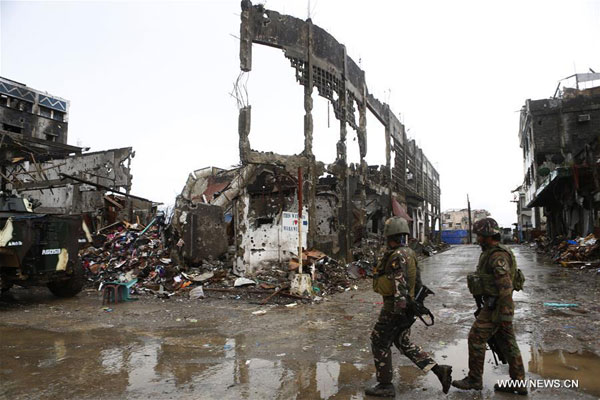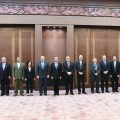
MANILA – Philippine President Rodrigo Duterte declared victory over Islamic State (IS)-linked extremists that took over the southern city of Marawi in May, ending nearly five months of fierce fighting that have killed more than 1,000 people and displaced thousands.
“Ladies and gentlemen, I hereby declare Marawi City liberated from the terrorist influence that marks the beginning of rehabilitation,” Duterte said in a speech to the troops and officials in Marawi.
Duterte arrived in Marawi to congratulate the Philippine security forces for wresting the city from IS-linked extremists.
Armed Forces of the Philippines (AFP) spokesman Restituto Padilla said on Tuesday that there are still about 30 “armed elements or strugglers” in Marawi.
Among the remaining six to eight foreign terrorists is Malaysian Mahmud Ahmad, the alleged financier of the terrorist group with links to IS jihadist group in the Middle East, he said.
Padilla added that there are still about 60 to 80 extremist-occupied buildings that need to be cleared.
AFP chief of staff Gen. Eduardo Ano said Marawi has been declared liberated.
“The small number of the remaining enemy can now be considered a law enforcement matter and does not constitute serious threat to hinder the succeeding phases of national government programs,” Ano said.
“What remains now is mopping up operations against Maute-ISIS stragglers in a small area. We can now begin the next phase which is damage assessment which is part of rehabilitation and reconstruction,” Ano said.
Hours after the May 23 terrorists’ attack, Duterte declared martial law for 60 days on the entire island of Mindanao. In July, Philippine legislators voted overwhelmingly to extend martial law until the end of the year to deal with Islamist insurgents.
On Sept 21, Duterte said that he would lift the martial law once the Marawi conflict is over and cleared of militants.
Philippine Defense Secretary Delfin Lorenzana told a radio interview that they are currently conducting assessment whether to lift or continue imposing martial in the Mindanao region.
Ano said on Tuesday that martial law should continue in the region, saying there are still extremist groups operating in the southern Philippines.
“But if everything is already okay, we will recommend to (Duterte) for the lifting of martial law,” Ano told a radio interview.
Aside from the Maute group, the Philippines also battles with other IS-linked groups like the Abu Sayyaf militants in the island provinces of Sulu and Basilan and the Bangsamoro Islamic Freedom Fighters (BIFF) in Maguinao, a province in central Mindanao.
The military said the Abu Sayyaf group has up to 400 fighters while the BIFF has up to 300.
Col. Romeo Brawner, one of the military commanders on the ground, told reporters in Marawi that the declaration of liberation of the city “is a strategic statement to tell the world that the war with IS is over.”
Brawner, however, said clearing up operations will continue to rid the areas with improvised explosive devices, booby traps, and other unexploded ordnance laid out by the retreating militants.
After the mopping up operation is completed, the rehabilitation will start to eventually pave the way for the return of the displaced city residents, he said.
Duterte’s declaration came a day after the killings of Isnilon Hapilon, the alleged leader of IS in Southeast Asia, and Omarkhayam Maute.
At dawn on Monday government troops killed the two top IS leaders who led the jihadist extremists that took over the city on May 23. The two along with Maute’s brother, Abdullah, with the help of Indonesian and Malaysian extremists, took mover the city since.
The fighting dragged on for nearly five months and has killed more than 1,000 people, including more than 847 extremists and 163 soldiers and policemen.
Ano said on Monday the deaths of Hapilon and the last of the remaining Maute brothers signaled the end of the IS-linked extremist groups particularly in the southern Philippines.
“We have nipped the budding terrorism (in the country), and stamped out the leaders of the Daesh-inspired terrorist group. We will not allow terrorism to reign in Marawi city or elsewhere in the country,” Ano said, adding that killings of the two “means their center of gravity has crumbled.”
The AFP called on Tuesday for a heightened security and increased vigilance in the wake of the killings of top pro-IS leaders.
Lt. Gen. Rey Leonardo Guerrero, the commander of the AFP’s Eastern Mindanao Command, directed all military units to raise their alert level and “prevent possible reprisal from the so-called “Maute-ISIS sympathetic groups after the deaths of Hapilon and Maute.”
“We ask everyone to be vigilant and to report to the authorities any suspicious activities in their respective communities,” said Guerrero.
The 148-day conflict has also displaced the city’s more than 200,000 residents and about 300,000 more outside Marawi city, the capital of Lanao del Sur province.
The military said at least 47 civilians have been killed by the terrorists. The health department said in July that 40 civilians died of sickness in government-run evacuation centers in nearby provinces. Thousands of evacuees are still housed in the centers.
The militants have also taken hostage several residents and used them as shield or forced them to fight the troops, the military claimed.
Months of airstrikes and heavy fighting have severely damaged many of the city’s infrastructure, including buildings and houses.
Television footage and images revealed the huge destruction in Marawi. Large swaths of the city, especially in the central business district, are a pock-marked moonscape of heavily damaged buildings, shops and houses.
Once the city is cleared of homemade bombs and unexploded ordnance, Duterte said the rebuilding and rehabilitation will start to pave the way for the return of thousands of displaced residents.
It will take billions of pesos to rebuild the ruined city, according to Defense Secretary Lorenzana, adding that the extent of destruction is far greater than expected.


